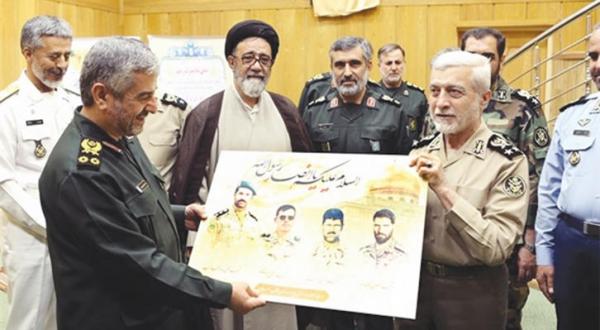London- The Iranian Army’s declaration on dispatching special forces into Syria sparked large controversy across all Iranian quarters. Ataollah Salehi, the third commander-in-chief of the Islamic Republic of Iran Army, has denied responsibility of sending troops into Syria, emphasizing that the Army has no accountability regarding their dispatch, and that orders came in from a “special authority” – which he refused naming- which is assigned for sending advisors into battlefields.
Salehi, in his first comment after the reported death of his special forces in Syria, said that the troops and advisors in Syria have been transferred there in a voluntary mission and that the Army did not order their dispatch.
Salehi went on repeating what has long been heard of Iranian officials on the advisory nature of the mission Iranian units are leading in Syria.
Commenting on the announcement previously made by the Iranian Brigadier General Ali Arasteh, deputy chief liaison of the army’s ground force, on sending his 65th brigade of special operations to Syria, Salehi said that his commandership never announced nor called on dispatching the 65th brigade.
Salehi clarified that some of the 65th brigade forces have been sent following orders coming in from a “specialized authority” responsible for sending military advisors to the war-torn country.
Although, Salehi has refused to divulge any information on who is throwing off Iranian advisors into battlefields in Syria, chances are that he may be referring to the Iranian Revolutionary Guard Corps (IRGC) and its division the Quds Force, given that those are the two official Iranian groups fighting side by side with Syrian President Assad’s forces.
Denying responsibility and blaming IRGC leaderships, Salehi managed to avert having Iranian Army commanders being added to the list of IRGC and Iranian police members who now face sanctions for their role in Syria.
The European Union and the U.S., since 2011, had imposed sanctions on IRGC leaders. The punitive measures include confiscating all belonging assets and ban from travel, as a step taken against their role in oppressing Syrian protestors.
IRGC commander Mohammad Ali Jafari, Quds Forces Major General Qasem Soleimani, IRGC head of Intelligence Hossein Taeb and the late IRGC Major General Hossein Hamadani all are among those subject to sanctions.
IRGC Maj. Gen. Hossein Hamadani was reported killed in Aleppo, 2015.
Salehi’s declarations were contradictory to those previously made by the commanding officer of the ground forces of the Iranian Army Ahmad Reza Pourdastan, who in the past two weeks – and on several occasions- had confirmed sending “advisors” from his Special Forces unit to join the IRGC troopers in Syria.
